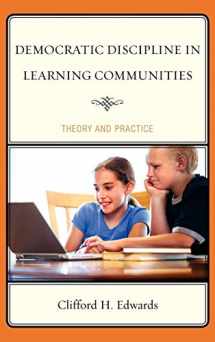
Democratic Discipline in Learning Communities: Theory and Practice
ISBN-13:
9781607099840
ISBN-10:
1607099845
Author:
Clifford H. Edwards
Publication date:
2011
Publisher:
R&L Education
Format:
Hardcover
196 pages
Category:
Education Theory
,
Schools & Teaching
FREE US shipping
Book details
ISBN-13:
9781607099840
ISBN-10:
1607099845
Author:
Clifford H. Edwards
Publication date:
2011
Publisher:
R&L Education
Format:
Hardcover
196 pages
Category:
Education Theory
,
Schools & Teaching
Summary
Democratic Discipline in Learning Communities: Theory and Practice (ISBN-13: 9781607099840 and ISBN-10: 1607099845), written by authors
Clifford H. Edwards, was published by R&L Education in 2011.
With an overall rating of 4.2 stars, it's a notable title among other
Education Theory
(Schools & Teaching) books. You can easily purchase or rent Democratic Discipline in Learning Communities: Theory and Practice (Hardcover) from BooksRun,
along with many other new and used
Education Theory
books
and textbooks.
And, if you're looking to sell your copy, our current buyback offer is $0.39.
Description
This book describes in detail the attributes of learning communities and how these characteristics help students acquire a sense of moral responsibility and commitment to fellow students. Clifford H. Edwards provides an account of how schools fail to satisfy student needs and thus promote discipline problems. Special attention is given to children's need for self-direction and how empowering them can promote more responsible learning involvement. There is also a focus on the factors that motivate learning and those that do not and how teachers can help their students become more intrinsically interested in school learning. Constructivist learning theory is presented as the most accepted explanation of how children learn and how it articulates with the learning community approach to education. The inquiry learning strategy is given as the most effective way to apply constructivist learning theory in classrooms. Appropriate relationships and effective communications are presented as essential components of learning communities and how they accentuate the effectiveness of this learning orientation. Democratic discipline within learning communities is described in detail.


We would LOVE it if you could help us and other readers by reviewing the book
Book review

Congratulations! We have received your book review.
{user}
{createdAt}
by {truncated_author}


